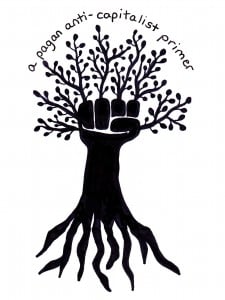Let me say first of all that I approve of the mere existence of this ‘zine, as well as Jason Pitzl-Waters’ Witchcraft Today – Witchcraft Tomorrow: A Manifesto, with which it makes a fine companion. The cover art is also excellent, and you can see more of Alley Valkyrie’s designs here. I see this work as both a visible manifestation of a lively artistic, intellectual, and spiritual community, and the beginning of an important conversation.
By way of engaging in that conversation, I have some quibbles. I could have wished for a little less primer and a little more Pagan. There’s a fair amount of explanation of how and why exploitation of labor is fundamental to capitalism and the history of same, but not enough (to my mind) of what that has to do with Pagans in particular. The most theologically profound observation in the ‘zine is made early on as an introductory remark and almost as an aside:
Lots of Pagan religions like the earth and believe in spirits, faeries, and gods of land, or in a great earth spirit or mother or goddess. That’s one of the reasons why Paganism is usually defined as an ‘earth-based’ religion. And who can own the land or the trees? Well, under Capitalism, people with money and power and access to the systems that delegate and enforce private property rights.
Well, yes. Let me put that another way: If we believe that the land and living beings in general are sacred, numinous and self-aware, how can they be owned? While historically the land could belong to a person or group of people, those people also belonged to the land. The relationship was reciprocal and nearly unbreakable. You could inherit, marry onto, or otherwise be given land, but you could not own it in the modern sense of being able to dispose of it as you wish; that is a relatively modern invention. One of the problems with capitalism is that it tends to reduce absolutely everything to its market value….land, water, ecologies, philosophies, religions. Human beings. In his weighty tome Capital in the Twenty-First Century, Thomas Piketty argues that capitalism is not self-regulating; that, in the absence of constraints, it will inevitably create greater and greater inequality, with all of the damage that entails. Similarly, the reductio-ad-forum of capitalism will tend to infest every single aspect and feature of life, unless you guard against it vigilantly. One may argue, as Piketty does, that capitalism has uses and the answer is to make sure those constraints are in place. One may also argue, as Rhyd Wildermuth and Alley Valkyrie (and many another radical) do that capitalism is fundamentally exploitative and destructive in a way that can’t be fixed, and it’s better to replace it with something else. (What?) But for Pagans, this is a potentially shattering question: If the land is sacred, if the Earth is our Mother, how can we let it be bought and sold? More generally, how can we understand value independently from the arbitrary and reductive values of the market? (which is an absolute necessity even if you think capitalism is just dandy). And, given that we live in a world full of people who don’t necessarily share our views, how can we make a moral or practical argument for the values that underlie the theology?
Honestly, I would have written an introduction of this nature differently; but since the logical response is “why don’t you do that, smartypants?” and I didn’t and don’t wanna (right now), I recommend you read A Pagan Anti-Capitalist Primer in its entirety (they also have a reading list at the end), and form your own opinions.

















